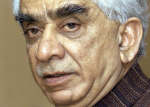Home > Business > Special
Jaswant Singh's 200 days
A K Bhattacharya |
January 22, 2003 14:02 IST
Finance Minister Jaswant Singh completed 200 days in office some time last week.
Two hundred days in the tenure of a finance minister is not always an occasion for celebration.
 Reversing a trend witnessed in the eighties, finance ministers in the last few governments during the nineties have proved to be a fairly durable commodity.
Reversing a trend witnessed in the eighties, finance ministers in the last few governments during the nineties have proved to be a fairly durable commodity.
Madhu Dandavate lasted the full term of the V P Singh government in 1989-90.
Yashwant Sinha had a short tenure in 1991, but that was not his fault. The Chandra Shekhar government itself fell with the Congress withdrawing support to it.
Manmohan Singh served the entire term of the Narasimha Rao government as its finance minister.
And P Chidambaram continued to be the finance minister even though the United Front government changed its prime minister.
Yashwant Sinha, too, had a fairly long stint as the finance minister under Atal Bihari Vajpayee.
So, when Jaswant Singh completes 200 days in North Block, why should anyone bother? Mr Singh, by all available indication, should complete the remaining year and a half of the Vajpayee government's term as its finance minister.
Yet, it would be interesting to assess the retired major's performance in a ministry, where he was most reluctant to come.
A man who as the foreign minister was supremely comfortable with the media, completely turned away from anyone remotely connected with a newspaper or a television channel.
Yashwant Sinha was sorely missed. There were no bytes for the electronic media on how the rupee was firming up, the interest rate was falling or how India's credit rating could take a knock or two.
A finance minister, he felt, should be heard very rarely. Indeed, he lived up to those words.
Jaswant Singh has made his own mark in North Block in his own inimitable style. First, he focused on the external environment in North Block.
A major renovation exercise was undertaken. The corridors were spruced up. The rooms in North Block began to look more respectable. Officers began to pay attention to dressing themselves smartly.
Then came his famous one-line observations of what plans to achieve as the finance minister. The first one took everybody by surprise.
"The poor man must get his food and the housewife have some money in her purse," said the finance minister.
This was a clean break with the past. Since the introduction of economic reforms, no finance minister talked about feeding the poor!
Jaswant Singh's second observation was an improvement. Making no secret of his dislike for widely used economic jargons like the gross domestic product and fiscal deficit, he mooted the idea of creating a gross contentment index of people.
His objective was very clear. Here was a finance minister who wanted to measure his success by the increase in the level of contentment in people.
The implicit argument was that if the economy was doing well, the people should also benefit and, therefore, their level of contentment should increase.
There was yet another famous intervention Jaswant Singh made within weeks of taking charge of North Block.
Arguing with trained economists and bureaucrats over the need for reducing subsidies, he wondered about the pace of progress made by governments in Europe and America in reducing subsidies for agriculture and textiles.
Since there was no satisfactory response, the finance minister came out with his own formulation: If the developed world was yet to slash subsidies for agriculture, the debate over subsidies was not yet over.
And when industry clamoured for tax reforms, Mr Singh asked his advisor, Vijay L Kelkar, to head task forces and submit reports on how to further restructure the direct and indirect taxes.
Dr Kelkar's reports created a political storm, as they hurt the vested interests of various sections of society. The finance minister did not utter a word.
He allowed his advisor to fight a lonely battle to defend the reports. He even got his party to look at these reports.
For those who were looking for resolution of long-pending problems, there was a lot of action. The Unit Trust of India crisis that blew in the face of Yashwant Sinha was resolved. You may not agree with it entirely. But a future course of action has been clearly outlined.
The huge outstanding debt of the steel sector has been restructured allowing the ailing steel companies some breathing space. The agenda for beefing up norms of corporate governance has been outlined.
The states' mounting debt burden is also set to be reduced with a controversial debt-swap arrangement being put in place.
How does one describe such a response from the finance minister? Is this an attempt at political packaging of economic reforms?
Or is he a gradualist who would push through reforms only in small doses at a slow pace and after ensuring its acceptance by the political establishment?
Either way, Jaswant Singh's 200 days have been quite eventful, even though he did not make them look like that.
Jaswant Singh's meeting phobia
The FM's 'maharaja' principle
Jaswant Singh's style
The finance minister's first 100 days
Jaswant Singh is new FM; Sinha moves to MEA
Powered by 